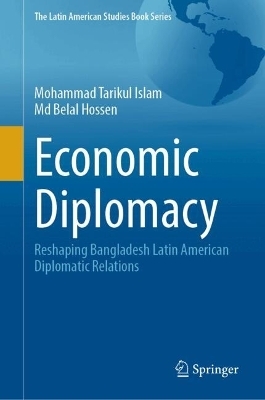
Economic Diplomacy
Springer International Publishing (Verlag)
978-3-031-81361-0 (ISBN)
- Noch nicht erschienen - erscheint am 02.04.2025
- Versandkostenfrei
- Auch auf Rechnung
- Artikel merken
Economic diplomacy has become more notable in recent years, helping developing nations like Bangladesh maximise their national interests. Bangladesh is rapidly transitioning from a low-income to a middle-income nation, with the goal of reaching developed status by 2041. Bangladesh engages in international trade with almost every country. Nevertheless, a considerable amount of global trade demonstrates a strong reliance on specific nations. Decreasing trade dependence is required to transition from an emerging economy to a high-income, financially independent nation. Having gained its independence more than 50 years ago, Bangladesh has been slow to form bilateral partnerships and expand its economic activity.
Consequently, Bangladesh remains dependent on China and India for imports, while focusing on America and Europe for exports. As a result of this economic interdependence, the dominant global powers enjoy the potential to pursue a proactive stance in the domestic affairs of Bangladesh. By taking steps to decrease its dependency on conventional trading partners, Bangladesh can increase the emphasis on non-traditional trading partners like Latin American and African countries. The formation and growth of a comprehensive economic diplomacy framework is required in this context. The aforementioned reasons generated the idea for a research investigation of Bangladesh's economic diplomacy with Latin America. Argentina now wishes to reopen their embassy in Bangladesh, spurred on by the extraordinary support the people of Bangladesh have shown for their country during the World Cup. In an effort to establish a Mexican embassy in Dhaka, Mexican Foreign Minister Marcelo Ebrard Casaubon is expected to visit the city in March as part of a high-level group.
This study shows that geographical distance and cultural differences do not have a substantial impact on building a market position in the Latin American region. Promoting Bangladesh through public diplomacy in the region can assist the country in increasing its portion of international trade. However, this requires a suitable framework for Economic Diplomacy.
The book examines prospective economic diplomacy methods for Bangladesh. This book offers fresh perspectives on various facets of Bangladesh's expanding trade relations with Latin America.
Dr. Mohammad Tarikul Islam is a Professor of Government and Politics at Jahangirnagar University, Bangladesh, recognized as an emerging political scientist and local government expert in South Asia. Before joining the university in 2014, he spent seven years with the United Nations Development Programme Bangladesh in research and project management roles. His work with the UNDP informs his current research and teaching on local government, climate negotiations, crisis, and disaster management. Since 2019, Dr. Islam has served as a Research Guide at the Bangladesh Public Administration Training Centre and offered courses at the National Defense College. He contributes regularly to the South Asia Blog of LSE, Oxford Political Review, SOAS Blog, and the Institute of South Asian Studies at NUS. His publications appear in international outlets like Routledge, Elsevier, Cambridge, SAGE, Oxford, and Springer. Notable books by Dr. Islam include "Local Government in Bangladesh," "Disaster, Governance and Development: Bangladesh Perspective," and "COVID-19 in South Asia: Its Impact on Society, Economics, and Politics." He has presented at prestigious institutions like Cambridge, LSE, SOAS, Oxford, Harvard, Hong Kong Polytechnic University and various universities in Asia. Dr. Islam is affiliated with Oxford, Harvard, Cambridge, and SOAS in various capacities (Visiting Research Fellow, Visiting Scholar, Post-Doctoral Fellow, Visiting Academics and Guest Faculty). His research interests include local government, crisis management, human security, climate diplomacy, sustainable development, project management, and forced migration.
Md Belal Hossen obtained his Bachelor's and Master's degrees from the Department of Government and Politics at Jahangirnagar University in Bangladesh. He works for The Business Standard, a reputable English-language daily in Bangladesh, as its diplomatic correspondent. He pursued both academics and professional journalism at campus. Being involved with Bangladesh's four major daily newspapers for six years has offered him genuine expertise. In that time, he reported event and investigation news, wrote features, and developed content. He served as president of Bangladesh's first campus journalist organisation, the Jahangirnagar University Journalists' Association. At university, he worked as the Executive Editor of the student-run article journal 'Poriborto'. Belal Hossen actively participated in a multitude of research-oriented endeavors right from the onset of his academic studies. He attended a number of academic workshops and seminars. His research prioritizes economic diplomacy, international trade and security, Local Governance and Development, and international migration and refugee concerns. At present, Belal Hossen is associated with the Nepal Institute for International Cooperation and Engagement (NIICE) as a research intern.
Introduction.- Two Economic Diplomacy and Bilateral Relations.- Contemporary and Prospective Economic Conditions of Bangladesh.- Eight Research Significance and Policy Suggestions.- Conclusion.
| Erscheint lt. Verlag | 2.4.2025 |
|---|---|
| Reihe/Serie | The Latin American Studies Book Series |
| Zusatzinfo | XX, 188 p. 8 illus., 6 illus. in color. |
| Verlagsort | Cham |
| Sprache | englisch |
| Maße | 155 x 235 mm |
| Themenwelt | Naturwissenschaften ► Geowissenschaften ► Geografie / Kartografie |
| Sozialwissenschaften ► Politik / Verwaltung ► Staat / Verwaltung | |
| Schlagworte | Bangladesh with LACs • Bilateral relations • Commercial Agreement • Economic Diplomacy • International Trade |
| ISBN-10 | 3-031-81361-8 / 3031813618 |
| ISBN-13 | 978-3-031-81361-0 / 9783031813610 |
| Zustand | Neuware |
| Informationen gemäß Produktsicherheitsverordnung (GPSR) | |
| Haben Sie eine Frage zum Produkt? |
aus dem Bereich


